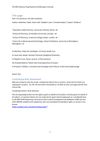
Search
for
Sort by
Research
270-300 / 381 results

research Conventional Suture Material Versus Staplers in the Closure of Donor Area in Hair Transplant: Which Is Better?
Both sutures and staplers are equally effective for hair transplant donor area closure, but staplers are faster and easier to use.

research Transplantation Immunology: Solid Organ and Bone Marrow
Transplant success has improved with better immunosuppressive drugs and donor matching.

research Kin-Cohort Analysis of LRRK2-G2019S Penetrance in Parkinson's Disease
The LRRK2-G2019S mutation in Parkinson's disease has a lifetime penetrance of 25-35%, and finasteride may help reduce symptoms in adult male Tourette syndrome patients.

research Azathioprine
Azathioprine's effectiveness and safety require careful monitoring and more research, especially regarding its use with corticosteroids and the role of TPMT status in patients.

research NUDT15, FTO, and RUNX1 Genetic Variants and Thiopurine Intolerance Among Japanese Patients With Inflammatory Bowel Diseases
Genotyping for NUDT15 p.Arg139Cys can help predict thiopurine side effects in Japanese IBD patients.

research Studying the Genetic Predisposing Factors in the Pathogenesis of Acne Vulgaris
Genetics play a role in acne, but how exactly they contribute is not fully understood.

research Vitamin D Receptor Polymorphisms and Polycystic Ovary Syndrome: A Systematic Review
The review found no clear link between vitamin D receptor gene variations and polycystic ovary syndrome.

research Toxicological Studies on Procyanidin B-2 for External Application as a Hair Growing Agent
Procyanidin B-2 is safe to use on skin as a hair growth product.

research Expression of Concern: Potential Risk for Developing Severe COVID-19 Disease Among Anabolic Steroid Users
Anabolic steroid users may face higher risk of severe COVID-19.

research The Effect of Active Hexose Correlated Compound in Modulating Cytosine Arabinoside-Induced Hair Loss, and 6-Mercaptopurine- and Methotrexate-Induced Liver Injury in Rodents
AHCC reduces hair loss and liver injury caused by chemotherapy in rodents.

research Comprehensive Spectroscopic Characterization of Finasteride Polymorphic Forms: Does Form X Exist?
Three finasteride forms exist; "form X" doesn't.

research Interaction Between Estrogens and Androgen Receptor Genes Microsatellites, Prostate-Specific Antigen, and Androgen Receptor Expressions in Breast Cancer
Certain gene patterns in breast cancer are linked to how active hormone receptors are and could affect patient survival.

research A Case of Squamous Cell Carcinoma of the Scalp After Several Synthetic Hair Grafts
A man developed skin cancer on his scalp after multiple artificial hair grafts.

research Encephalitis Lethargica Due to Epstein–Barr Virus Infection
Finasteride may help reduce tic severity in male Tourette syndrome patients.

research Characterization of Human Ovarian Teratoma Hair Using AFM, FT-IR, and Raman Spectroscopy
Teratoma hair is similar to scalp hair but has a rougher surface and lower adhesive force.

research Burns with Emollients: Fire Risks and Safety Precautions
Emollients can make fabrics more flammable, so take safety precautions.

research News Review: Lipid Technology May 2014
New cleaning surfactants, biofuel production plans, dairy expansions, improved lipid testing methods, and various product launches and developments were reported in lipid technology.

research Efficacy and Safety of Hair Serum Containing Greyverse, EUK 134, and Amisol Trio in Premature Greying of Hair
The serum is safe and helps treat premature greying of hair.

research The Rotterdam Study: 2010 Objectives and Design Update
The Rotterdam Study aims to understand various diseases in older adults.

research Generic Development of Topical Dermatologic Products: Formulation Development, Process Development, and Testing
The document concludes that developing generic topical drugs requires ensuring they match the original in quality, composition, and structure, and often involves complex testing and regulatory steps.

research Procyanidin Oligomers Selectively and Intensively Promote Proliferation of Mouse Hair Epithelial Cells In Vitro and Activate Hair Follicle Growth In Vivo
Procyanidin compounds from grape seeds were found to significantly increase mouse hair growth.

research HPLC-ESI-MSn Characterization of Phenolic Compounds, Terpenoid Saponins, and Other Minor Compounds in Bituminaria Bituminosa
Researchers found over 40 compounds in Bituminaria bituminosa, including many flavonoids and some with potential for medical and hair care uses.

research Platelet-Rich Plasma: The Ultimate Secret for Youthful Skin Elixir and Hair Growth Triggering
Platelet-rich plasma, taken from a person's own blood, can help rejuvenate skin, stimulate hair growth, and treat hair loss, but more research is needed to confirm its safety and effectiveness.

research Small Molecules and Small Molecule Drugs in Regenerative Medicine
Small molecule drugs show promise for advancing regenerative medicine but still face development challenges.

research The Biology of Hair Diversity
Hair diversity is influenced by complex genetics and environmental factors, requiring more research for practical solutions.

research Review of Fluconazole Properties and Analytical Methods for Its Determination
Fluconazole is an effective antifungal medication with potential side effects and lacks official analytical methods for its determination.

research Interactions of the Vitamin D Receptor with the Corepressor Hairless
Most Hairless gene mutations reduce its ability to work with the Vitamin D Receptor, which might explain a certain type of hair loss.

research Protective Role of Nutritional Plants Containing Flavonoids in Hair Follicle Disruption: A Review
Some plants with flavonoids may help treat hair loss and promote hair growth.

research Thyroid Diseases and Skin Autoimmunity
Thyroid diseases may contribute to autoimmune skin diseases, and more research is needed on their relationship.